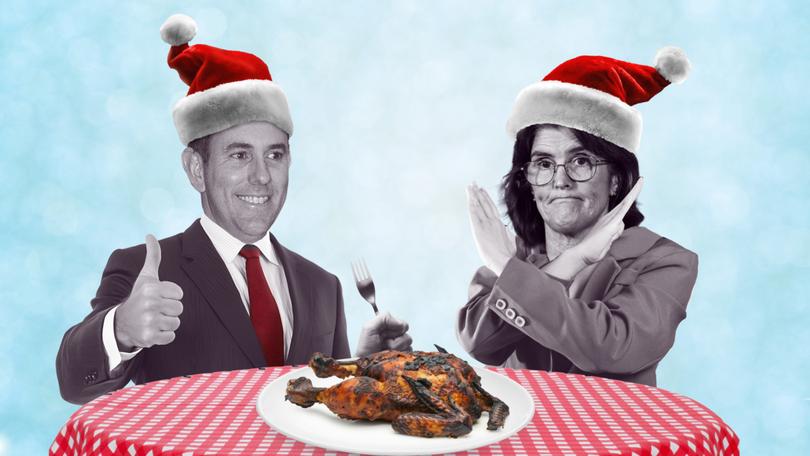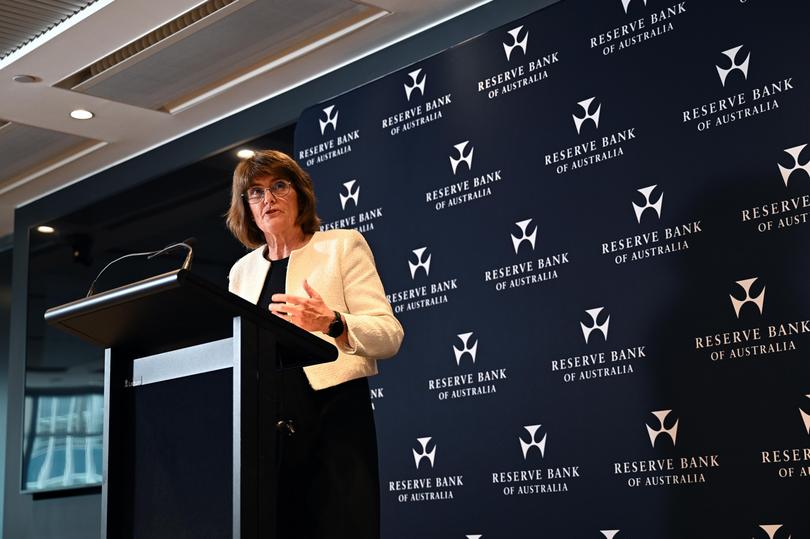Reserve Bank interest rates reaction: No Santa rate relief for suffering economy, homeowners
The RBA says the economy is too hot, business says it’s too cold. The Government says it has saved the country from recession and the Opposition says the private sector is swamped. Welcome to Christmas 2024.

Michele Bullock says the economy is too hot for a rate cut.
Business says it is too cold to invest.
The Government says it has saved the country from recession with a big public spending package.
Sign up to The Nightly's newsletters.
Get the first look at the digital newspaper, curated daily stories and breaking headlines delivered to your inbox.
By continuing you agree to our Terms and Privacy Policy.The Opposition says the private sector has been swamped by unsustainable, unnecessary state-funded boondoggles that have masked nearly two years of a per capita downturn.
Welcome to Christmas.
Unfortunately, the turkey-induced slumber is likely to continue all summer.
While conditions have now deteriorated to the point where growth is the lowest it has been since the early 1990s — COVID notwithstanding — the unemployment rate remains low and inflation continues to be too high.
COVID, interestingly, is very much still on Reserve Bank Governor Michele Bullock’s mind.
Her view is that the hangover from the post-COVID boom in spending is yet to subside.
“Growth exploded so strongly coming out of the pandemic and the economy couldn’t supply the goods and services that people were demanding. We’re still experiencing that, so we have to have a period of slower growth,” she said.
Bullock sees a world potentially permanently changed, with higher inflation — and as a result higher interest rates.
“Prices are not going back to where they were before. The high inflation of the past couple of years has permanently increased the price level. Prices in September quarter 2024 were 16 per cent higher than they were three years earlier,” Bullock says.
“That’s hurt everyone, but particularly those on lower incomes and the more vulnerable. We haven’t had a sustained period of high inflation in Australia for more than 30 years. It’s not familiar to people but it’s one of the key reasons people are finding it harder to make ends meet.”
The RBA declared that it is resolute in its determination to return inflation to target and is “gaining in confidence” that it will decline as forecast by 2026. That had markets increasing their bets of a rate cut in February.

National Australia Bank chief economist Alan Oster thinks that is unlikely.
“The RBA only review their forecasts and look at the medium-term outlook only four times a year and one of those is in February. So unless something radically goes wrong, February is a bit too early. Therefore you move to the next one, which is May,” Oster says.
That’s well after an election and of no help to Jim Chalmers, leaving him with little in the way of options other than more spending on cost-of-living relief, or hoping like mad that China’s announced stimulus is more action than talk. Spending, which is already $6 billion higher than forecast in the Budget is about to go up with the Treasurer announcing another $2 billion for Queensland natural disaster relief.
While shadow treasurer Angus Taylor attacked the Government for thinking the “the answer to every problem is more government spending”, Bullock was more generous.
“The private sector is very weak, and the public sector is is filling a bit of a gap there. Public consumption is contributing to services that Australians consume, things like health and aged care. It’s serving a very good purpose,” she said.
Bullock also supported the Government’s approach to tackling inflation.
“When I speak to the Treasurer, I believe him when he tells me that he is absolutely on the same page,” she said.
“He understands, like I do, that inflation is really what’s causing so many troubles for Australian people at the moment.
“I do think they are conscious of the inflation implications, and I think that’s why they have tried to approach things like rebates in the way they’ve done.”
Signs of growth emerging
Moderating inflation, tax cuts and energy rebates were contributing to a potential economic uplift.
“Our forecast suggests that growth will start to pick up as real disposable incomes start to pick up over the coming year,” Bullock said, citing some of the more recent figures around Black Friday consumption.
But that seems to be at odds with what the business community is feeling, where the ongoing malaise is clearly starting to bite.
NAB’s business survey today suggests that last month’s optimism was an aberration. Retail and wholesale confidence is shot, and conditions for retail and manufacturing are firmly in the negative. All those sectors have pulled back on new orders.
There was some hope that the Black Friday sales were a sign that things were picking up, but the data continues to show that the stage three tax cuts have been filling up the rainy day fund rather than being splashed around the community.
According to NAB, young people are especially hesitant to spend, and have been saving instead. “That’s not what we expected,” Oster said.
Growth is in services rather than goods consumption, suggesting that spending is on essential items like insurance and energy rather than discretionary purchases.
NAB thinks that the given the weakness they are seeing, the RBA may cut more than many expect. Oster sees a full rate cut of one per cent in the next year to year and a half with the official cash rate falling to 3.1 per cent from the current 4.35 per cent.
Oster also predicts that Australia should be one of the better global performers in terms of GDP next year, with forecast growth of a little over two per cent.
China may change that equation, with its stimulus announced yesterday but Oster is not so sure.
“They keep saying they’re going to do something, then they never do,” he says, while pointing out that China’s debt levels are such that it doesn’t have much room for further government borrowing. The highly indebted private sector may not also see much room to borrow more if rates are cut.
Bullock seems to share his view, telling reporters today that she can only focus on Australia’s domestic economy, while Chalmers can only pray that China delivers a Christmas miracle.
“China has been a big concern to us when it comes to the slowdown. Any proactive steps to support growth in the Chinese economy are welcome,” he said.

